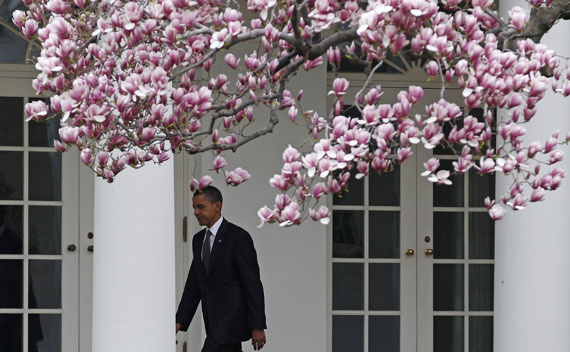TWE Quick Takes: President Obama Speaks About Libya
More on:

If you want to be fully prepared for President Obama’s address to the nation tonight on Libya, check out Jonathan Allen’s piece over at Politico.com. It’s a nice scene setter on the challenges the president faces. A paragraph to note:
The hostilities in Libya haven’t abated. A campaign the White House promised would be measured in “days, not weeks” is now into Week Two. The fundamental mission of the U.S. and its allies appears to have moved past establishing a “no fly” zone to prevent Qadhafi from advancing and morphed into a second-phase effort to assist the rebels in pushing westward.
Allen is exactly right on the evolving nature of the Operation Odyssey Dawn mission. One thing to watch for tonight is whether President Obama acknowledges that NATO’s “kinetic military actions” look to be about more than protecting the civilian population. (Ben Smith says the White House is pursuing “the Strategy-That-Shall-Not-Be-Named, which is to say, regime change.”)
William Saletan has another piece worth reading over at Slate that suggests that what senior administration officials had to say on the Sunday morning talk shows isn’t helping the White House. Secretary of Defense Robert Gates attracted a lot of attention because he said on "This Week" that Libya “was not a vital national interest to the United States.” Gates has said this before, so he wasn’t opening up new ground. But it’s a reminder that Obama can’t argue tonight that he ordered military action out of necessity. Operation Odyssey Dawn is clearly a choice.
A more troubling comment came on "Meet the Press," where Secretary of State Hillary Clinton explained the rationale for Operation Odyssey Dawn to host David Gregory as follows:
Do [the Libyans] have a major influence on what goes on in Europe because of everything from oil to immigration? And, you know, David, that raises a very important point. Because you showed on the map just a minute ago Afghanistan. You know, we asked our allies, our NATO allies, to go into Afghanistan with us 10 years ago. They have been there, and a lot of them have been there despite the fact they were not attacked. The attack came on us, as we all tragically remember. They stuck with us. When it comes to Libya, we started hearing from the U.K., France, Italy, other of our NATO allies. This was in their vital national interest. The U.K. and France were the ones who went to the Security Council and said, "We have to act, because otherwise we’re seeing a really violent upheaval with a man who has a history of unpredictable violent acts right on our doorstep.
As Saletan archly puts it, Secretary Clinton’s position seems to be that “attacking Libya was the Europeans’ idea—not just for moral but for self-interested reasons—and we’re going along to pay them back for helping us in Afghanistan.” That’s hardly an effective rallying cry for most Americans.
And now this just in. Deputy National Security Adviser Denis McDonough said at this morning’s White House press briefing that “We don’t make decisions on interventions based on consistency or precedent.” I don’t know the context in which the remark came, or what point McDonough was trying to make, but as a stand-alone (and oft-retweeted remark) he hasn’t done his boss any favors.
The president has his work cut out for himself tonight.
More on:
 Online Store
Online Store